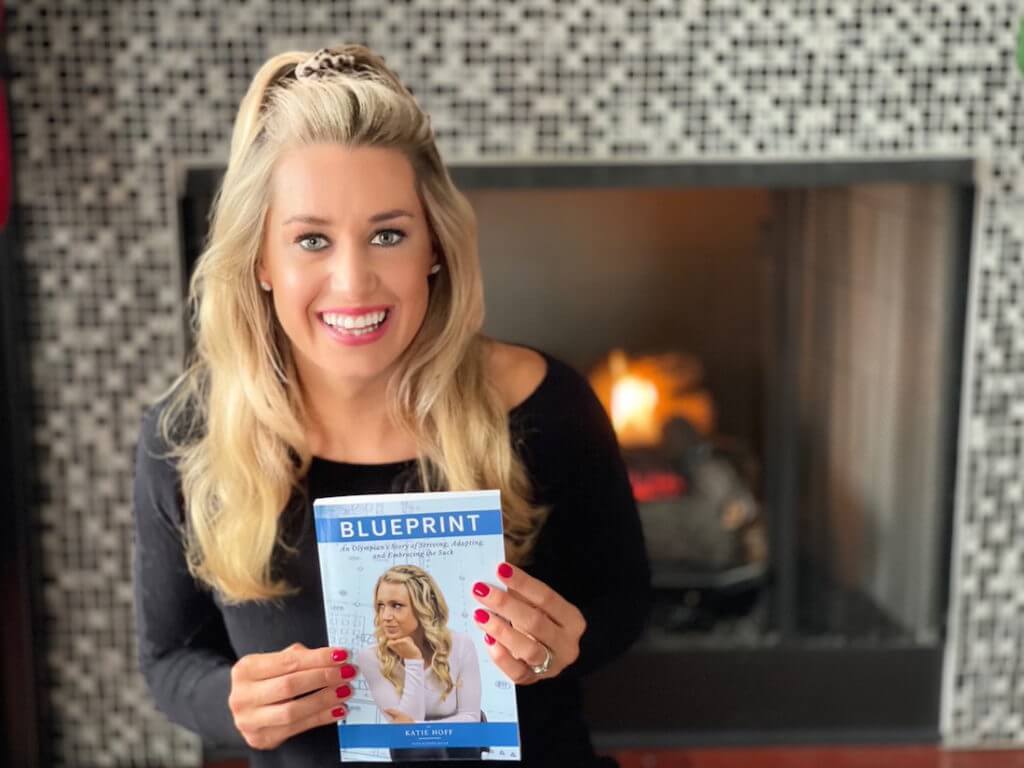Katie Hoff Inside ‘Blueprint’ and ‘Embracing the Suck’

Katie Hoff had great triumphs, but also great struggles during her career. That is why her memoir is titled: “Blueprint: An Olympian’s Story of Striving, Adapting and Embracing the Suck.”
Every swimmer, every athlete — every human — has some suck to embrace in their life.
Hoff’s memoir unleashes a candid vulnerability that gives the reader an unfiltered look at Hoff’s life and how each experience molded her into the person she is today. It is available at kthoff.com (and autographed copies are available).
“The biggest source of pride when people give me feedback about it is when they say they can relate to a part of it, especially the tough parts,” Katie Hoff told Swimming World. “Those are the moments that make it worth being that vulnerable in this book. That was really the ultimate goal.
“I was really nervous because you are so focused on the process, you don’t think about the reaction. So many people were reading so many vulnerable things. I have been getting to some cool feedback from friend, family and strangers. I have been hearing from people way back in my past and that has been very meaningful.”
But getting reaching that goal involved a new outlook on Hoff’s journey. It is a story that can be read by all ages. There are some adult topics discussed, but in a guarded but honest way that younger swimmers and fans could relate to.
“I ultimately wanted it to be for anyone. There were definitely adult things I talked about, but I wanted it framed in the right way that younger athletes could take something from it or relate to it,” Hoff said. “I just wanted my story to be real and authentic and me. I think it happened naturally to me.”
Between sections of the book are topical interludes where Hoff writes a couple of paragraphs about aspects of life like fear, mediocrity, luck, who I am. They were originally supposed to be exercises for Hoff as she started, given by collaborator Richard Bader. They turned into an interesting aspect of the book.
“That happened very spontaneously. My ghostwriter asked me each week to write for 5-10 minutes on a topic that he prompted. I viewed it as helping him get inside my psyche. He loved them and he included them. He thought it made sense to include those. I had mixed feelings at first, but they helped it be more authentic. It was all from the heart, a little break from the story, something I wasn’t writing to be printed,” Katie Hoff said.
But it is printed, and gives a deeper insight into Hoff.
When discussing fear, Hoff wrote in part: “It grips and paralyzes. It feels like at any moment the ground beneath you is going to fall away. But it’s also what makes something worth doing.”
Hoff’s journey is detailed with a candid, almost conversational tone. She didn’t shy away from the happy, the sad, the awkward, the challenging moments.
“I didn’t want to write a story and not be honest and real. That is why it took me five years to even have the courage to executing this project and making it a book,” she said. “There were so many moments, but I didn’t want to leave those things out. It is extremely important for anyone to understand things behind the scenes for people who accomplished something. I wanted to highlight those, and wanted to show the lesson of getting back up. That is the most important lesson is being able to get back up. That is what is real. Nothing is perfect. In order to be successful that is a trait that will take you very far in life.”
Hoff discusses her relationships with family, friends, teammates, coaches — even the rocky times.
One of those storylines is the at-times rocky relationship with coach Paul Yetter. That was illustrated with a purpose.
“I wanted to put in details that helped others understand my story. I do think it is something that can resonate with coaches and swimmers and bring forth some communication. It takes everyone communicating because there are two sides to every relationship,” Hoff said.
That communication has helped Hoff understand mental health in a different light as well.
“So much of this was just telling my story. If I hadn’t included those pieces, I would have been fluffing things up, and not been real. Every athlete struggles with this in some way,” Hoff said. “Knowing someone else is going through it helps people understand it. I hope that someone can read that and see it is OK not to be OK.
“I definitely didn’t have the full awareness of it then. You have to be open and accepting and I don’t know if at that age I was ready. You have to be open and honest with yourself to receive help with someone. I think the swimming world and the Olympic committee are on the right track with this, helping people not feel alone.”
Now, Katie Hoff’s story is another way for people to relate to the ups, the downs and the suck that happens to everyone.



